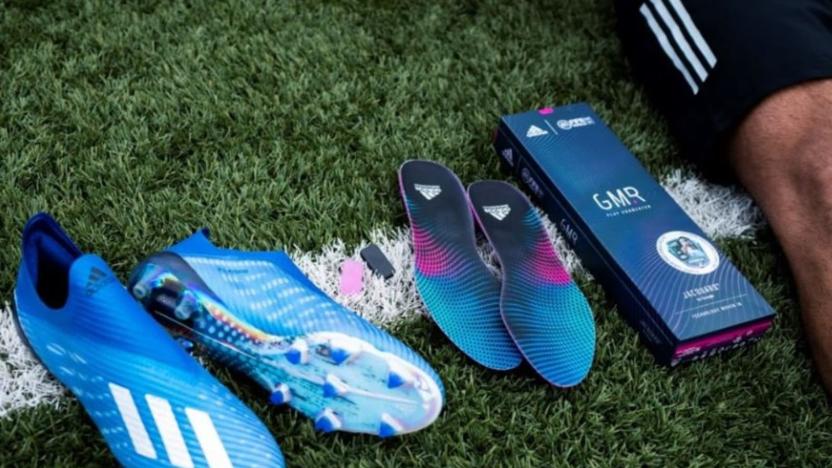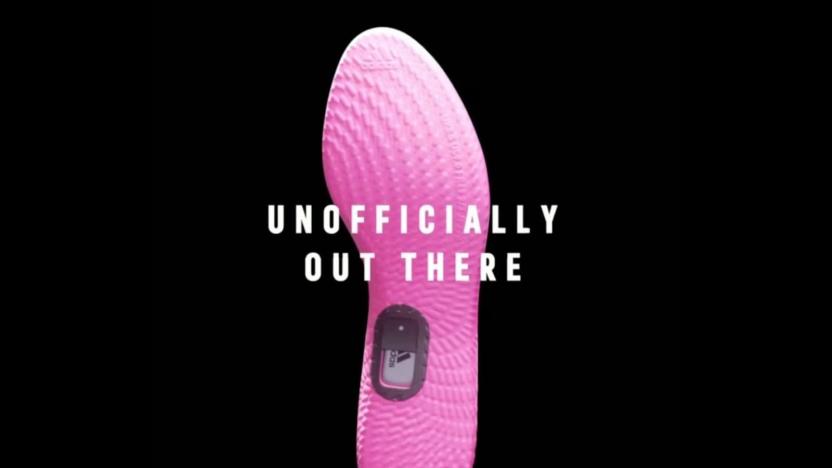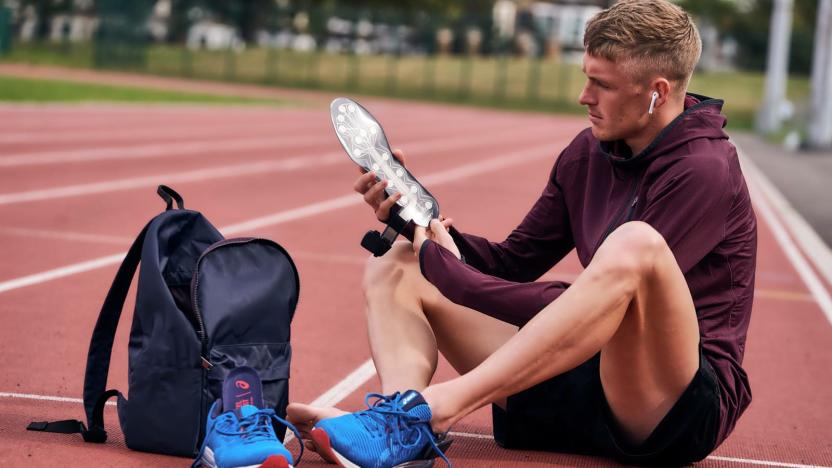insole
Latest

Adidas' smart insoles use Google tech to improve your 'FIFA Mobile' scores
Just a few days ago Google and Adidas teased a smart insole designed to work with FIFA Mobile -- now we know exactly what it looks like. The Adidas GMR slips into your sneakers to monitor your performance during real-world soccer play, measuring your kicks and ball control and connecting to FIFA Mobile to give you challenges to improve your overall performance.

Google and Adidas prep smart insoles that tie into 'FIFA Mobile'
Your swift-footedness in real life could soon translate to the games you play. The combination of an official teaser and a Footy Headlines leak has offered a peek at Adidas GMR insoles that use a Google Jacquard tracking tag to not only measure your kicks and ball control, but translate that performance to FIFA Mobile. Your skills, including in real-life challenges, promise to improve the Ultimate Team in your game.

A smart running shoe insole detects your gait to offer coaching advice
There have been smart insoles before, but Nurvv is betting that its shoe companions could be particularly helpful if you're a runner. Its Nurvv Run insoles pack 32 sensors that, along with mobile apps and included GPS trackers, provide coaching both during and after runs. You can get updates on standard stats like cadence, step length and overall pace while you're mid stride thanks to audiovisual and haptic feedback. However, you can also venture into the app post-run to look at minutiae like your pronation (foot roll) and foot strike (how much of the forefoot hits the ground). You'll know whether a change in technique leads to practical gains.

A smart insole pairs with an app to track how tired you are
Two years ago, at CES 2016, we found a pair of smart shoes that could be "laced" by simply tapping a virtual button on a smartphone app. Now, the company behind those sneakers, Zhor Tech, has brought its latest creation to CES 2018: a connected shoe insole. The device is loaded with sensors that count your steps, detect your fatigue levels, analyze your posture and detect any rough vibrations around you. Zhor Tech says that its Safety insole was designed specifically for people who work in construction and other field jobs.

Digitsole's smart insoles keep your tootsies warm as you walk
Most people believe that wrist-worn wearables are technology's next frontier, but only one company that we know of has thought about our feet. Today, that number increases to two, now that Digitsole has announced an interactive insole that's designed to heat your feet. Connecting to your smartphone over Bluetooth 4.0, you use the companion app for iOS or Android to set the temperature to a maximum of 40 C/104 F. Of course, no piece of wearable technology is complete without some sort of activity tracking, so in addition to keeping your little piggies warm, the smart insoles will monitor the distance that you've walked and the calories that you've burned.

This activity tracker lives in your shoe's insole
We're still several days out from CES, and we've already seen previews of a couple of fitness tracking devices. It's far, far too early to start talking overall trends for the show, but it seems pretty safe to suggest that we'll be seeing even more before the week is out. At the very least, Footlogger ("-logger," not "-locker," mind) offers a bit of an alternative to the standard wristband devices. The insole-based gadget is probably more in-line with those socks we saw the other day, but arguably has the potential to record even more detailed information about things like foot strike position - as for how such a product would stand up to the stress of of daily running, however, we certainly can't say. 3L Labs is talking up a wide range of potential uses for Footlogger's three-axis accelerometer and eight pressure sensors, including the standard activity tracking and sports recording fare. The company is also making some interesting healthcare claims here, including rehabilitation monitoring and even potential early disease prediction. You can check out the company's admittedly dated-looking site in the source link below.

eSoles record foot pressure, not Inner City Pressure
The city is alive, the city is expanding, and we all know that living in the city can be demanding. But when lyrics from Jemaine and Bret just can't get you through the day, there's always eSoles -- er, something like that. At any rate, the aforesaid startup has developed specialized shoe insoles that are laced with pressure sensors (11 to be exact), all of which can communicate wirelessly with a nearby cellphone in order to provide real time analysis of one's step. In theory, these devices would enable athletes such as bikers and golfers to better understand how to position their feet in order to maximize performance. Founder Glen Hinshaw has stated that he hopes to have the product available in trial form by July, with full commercialization happening later this year. The pain? Around $300 to start, but he's hoping to bring that closer to $50 when production ramps up.

iShoe promises to detect balance problems before it's too late
There's plenty of devices out there designed to keep folks from falling over, but this so-called iShoe developed by some MIT researchers takes a slightly different tact, with it promising to detect balance problems long before a person actually falls. That's apparently possible thanks to some sensor-laden insoles that measure the pressure distribution across as person's feet, which can be offloaded onto a computer and analyzed with the aid of a special algorithm the researchers have created. Eventually, they say the system could let doctors catch balance problems in their early stages and take the appropriate action, or even notify family members if a person falls, although that latter bit doesn't exactly seem very optimistic of them. No word on a commercial release just yet, but the team is apparently moving steadily towards one, with it currently conducting trials and recently having snapped up a $50,000 grant to help cover start-up costs.






